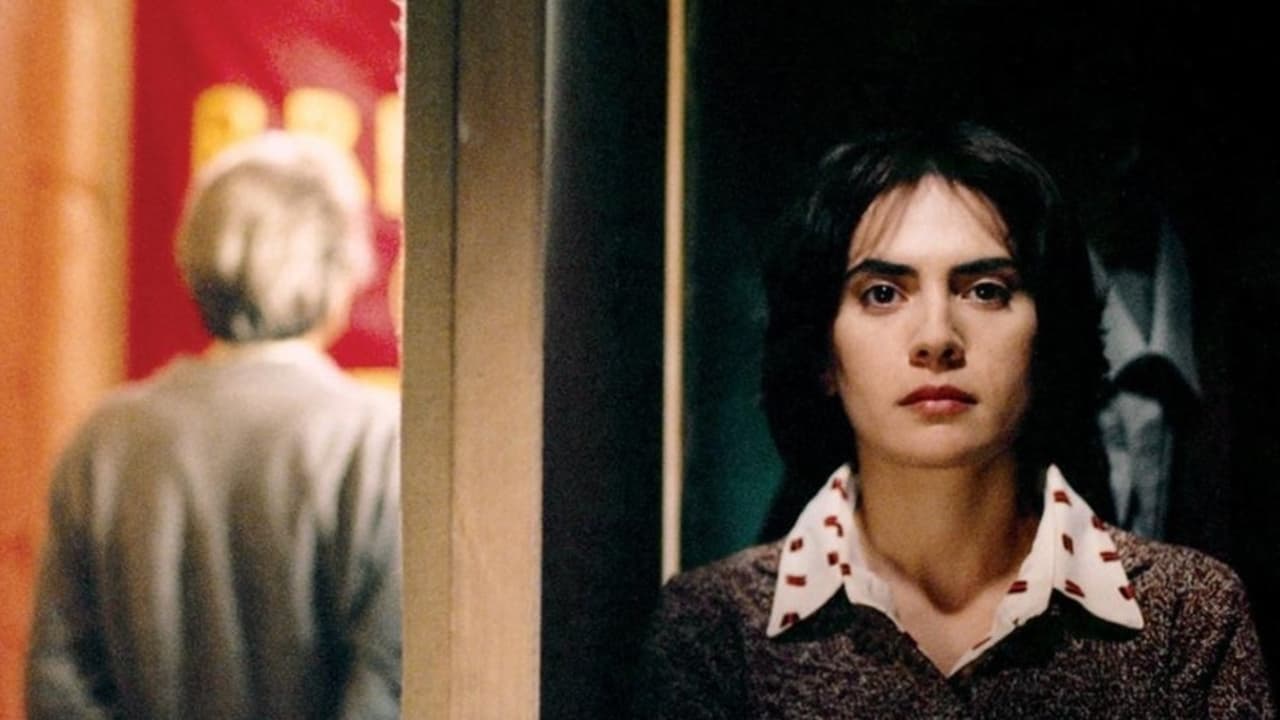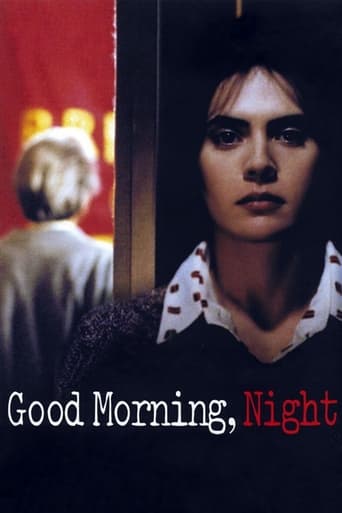

Aldo Moro's kidnapping and murder was at its time a huge event for the Italian history and the world. With the recrudescence of terrorism at the beginning of the 70s, some of the extreme left movements in Europe - especially in Germany and Italy - embraced the path of the 'armed struggle', a deformation of the Marxist concept of class struggle in a try to stop the historical reconciliation between the traditional political parties and an Italian Comminist Party already feeling the winds of reform that will melt down the Iron Curtain 10-15 years later.Marco Bellocchio's film tackles the story from the perspective of the day to day life of the kidnappers, and through the eyes and dreams of one of the kidnappers - the only female in the group. We do not see any of the bloody events of the kidnapping or the outcome, and most of the action happens in the rented flat where the captors kept Moro imprisoned. The director and the splendid main actress Maya Sansa succeed to re-create the political conditioning and the motivations that brought the young woman to join the terrorist fighting path, but also the human dimension that brings her back the feelings of compassion to the victim. It is Aldo Moro's portrait played by Roberto Herlitzka which seems surprinsigly more sketchy, and I had the feeling that a greater message about the relationship between kidnapper and victim was missed.It is still an interesting movie to watch, minor in style but human, dealing from a different perspective with a theme that too often generated films that were spectacular, but deprived of any true emotion. 8 out of 10 on my personal scale.
... View MoreI won't comment on the film's artistic merits, which I regard as noteworthy, nor on the psychological portrait given of the brigatisti, which I thought interesting but flawed. I will only say that the film was deeply moving for me and had me crying uncontrollably at times. I wish to give, instead, a sketch of the film's political context for the benefit of those whose familiarity with that period in Italian politics may be limited.By 1978 Italy had been ruled uninterruptedly for more than 30 years by coalition governments, all of which were dominated by the Christian-Democratic party (DC). The Italian Communist Party (PCI) had been thrown out of the government in 1947 (in part, on the insistence of Washington as a condition for Italy's receiving Marshall aid monies), and it was excluded from all governments even though its share of the popular vote rose with every post-war election, making it the second largest party in Italy (it peaked at more than a third of the vote in the late 1970s). The PCI was not your average Communist party. It espoused a route to the transformation of capitalism that emphasized gradualism, social mobilization, and electoral politics--and by the early '60s its commitment to the acceptance of the principles of democratic pluralism was public and pronounced. By the end of the '70s, Italy was sorely in need of reform--the kind of reform in institutional arrangements and socio-economic policies that could only come through a change in government. The 30 years of DC rule had created a regime rent through and through with corruption and unresponsive government (by contrast with the regional governments run by the PCI, which were models of efficiency and responsive government). But the US and most of the DC continued to argue that the opposition should not be allowed to come to power under any circumstances because of the "Communist menace." Aldo Moro, president of the DC at the time, was one of a few DC leaders receptive to the idea of bringing the PCI into the government to effect reforms and make the country more governable--responding, as he was, to the initiative of Enrico Berlinguer, leader of the PCI, who called for an "historic compromise" with the Catholic masses and their party. But at the same time that the PCI was inching towards the government, there were fractions of the left in Italy that felt that the PCI was selling out the dream of making "The Revolution". Certainly it was true that the PCI had long abandoned the notion of "Revolution in the West" as resembling anything like the storming of the Winter Palace in St. Petersburg in 1917 (note the imagery of revolutionary Russia thrown into the film by Bellocchio as representative of the consciousness of the brigatisti). But the PCI continued to be nominally wedded to the idea that capitalism was not the final resting place in the evolution of human social-economic systems, and that it could and should be replaced by a system of production based on production to satisfy human needs rather than private profit. The closer the PCI moved towards government and compromise with the DC, the more this commitment to a socio-economic order alternative to capitalism was put into question in the eyes of Italy's "revolutionary" left (all of which, by the way,existed outside of the PCI in other social and political organizations). Enter the Red Brigades (BR). Most of the their ranks were filled with leftists who came to "revolutionary" politics via Catholicism and the social gospel. They believed themselves to be heirs to the tradition of revolutionary militancy (and armed struggle)embodied in the Resistenza, the struggle against the German occupation of Italy,1943-45--a struggle which, in the minds of many of the combatants, was waged for the sake of a socio-economic order alternative to the inequalities and irrationalities of capitalism (it was mainly Bellocchio's use of clips showing the execution of "partigiani" (resistance fighters) and the reading of the letters they had written just prior to their execution which brought me to tears). The BR believed that through "exemplary" actions (the knee-capping or killing of politicians, journalists, and trade-unionists seen by them as enemies of the working class) they might be able to galvanize the masses of the working class, whose revolutionary militancy had, presumably, had been lulled into a quiescent state by the "sell-out" leadership of the PCI.The kidnapping of Moro was designed to put a stop to that process, and indeed it succeeded well. To the delight both of the "revolutionary" left and Washington the PCI was kept out of the government for almost another 20 years, until after the fall of the USSR and the complete dissolution of the DC under the weight of a gigantic scandal. One side note: Bellocchio is certainly in error in suggesting that Stalin would have been part of the fantasies of the BR--while they greatly admired Lenin for having pulled off the Bolshevik Revolution, they detested Stalin and the bureaucratized party rule that came in his wake.One final note: I'm not sure I understand why Bellocchio has chosen as his counter-hero a figure who suggests the use of "fantasia" as an alternative to violence. It was precisely the BR's "flight of imagination" that got them into trouble, imagining a world that didn't exist in Italy--a world of revolutionary seething masses just waiting for a spark to ignite them. In politics there's no substitute for Machiavelli's "chiaroveggenza" (the capacity to see things clearly).
... View MoreI've read the other comments on this board and I would like to precise that Aldo Moro at the time was not the Italian President and that obviously the Red Brigades were out for his blood because he was working skilfully at a compromise between the Christian Democrats and the Communists and that meant for the extremists of the left to be cut out from any kind of power or hold they might have on the Government. The film itself does not seek to give political answers and is much more concerned with the human aspects of the drama. It's more lyrical than realistic... if you're looking for action or for a docudrama, you should probably go elsewhere.
... View MoreI loved so much last Bellocchio's movie, the masterpiece "L'Ora di Religione". It had a great screenplay, great actors (well, have to say Castellitto is so much greater than others), a brillant use of lights for a great cinematography.Well, Buongiorno Notte is a different story. Ridiculous screenplay erupting tons of morals (and we could speak weeks about politics, you know we are italians...). Poor cinematography (it's too simple representing '70s dark years with dark colors and dark lights, do some efforts more peoples!!!!). Bad use of music: what's the point of using psychedelia to represent the tragic rationality of Brigate Rosse?And to all the people who claimed the main prize in Venice, I answer:"Are you nuts????" Maybe the russian film was bad but not as bad as this.I'm down with the P.E. Don't believe the hype!!!!
... View More